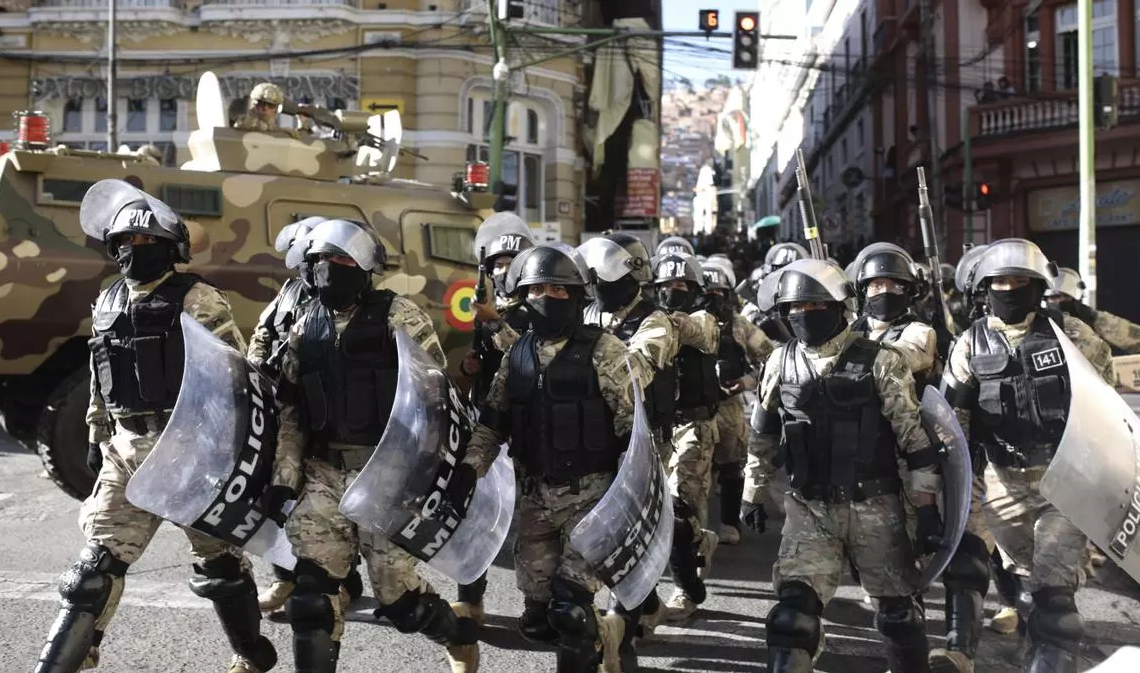On Wednesday, June 26, military forces stormed Plaza Murillo in La Paz, transforming Bolivia’s political center into a national and international media hub for a few hours. This event sparked widespread psychosis among Bolivians in various parts of the country, evoking the worst memories for those who witnessed the birth of Bolivia’s now forty-year-old democracy. Juan José Zúñiga, the army commander of the armed forces until the day before the coup attempt, was once a trusted man of the president, but was arrested for acts of corruption during the Morales government. He became the protagonist of Bolivian politics when a military tank breached the gates of the Palacio Quemado (the former government house) and attempted to seize power for three hours.
However, was this a real coup attempt to redirect the government’s path, or a political dramatization to improve the image of President Arce? From the narrative, the perpetrator put Bolivian democracy at stake through illegal tactics. Another reading could be that of a performance where the puppeteer puts his puppet to act to gain popularity.
The political circumstance
On Monday, June 24, Zúñiga (today dismissed, arrested and accused of terrorism and armed uprising against the sovereignty of the State) issued a disturbing political opinion: that he did not agree with the candidacy of Evo Morales to the presidency and that, furthermore, if required, he would apprehend him. This statement provoked his dismissal by President Arce, who relieved him on Tuesday, June 25. He, however, continued to fulfill his official duties and did not hand over his office, causing uneasiness among some members of the armed forces.
At the time of his arrest, on the day of the break-in at the Palacio Quemado, Zúñiga justified himself and justified his condition as a state agent in order to, paradoxically, “reestablish democracy” by force. And, in order to gain popular sympathy from the opposition, he proposed to free political prisoners, among them, Luis Fernando Camacho and Jeanine Áñez.
But in declarations between pushing and shoving and before being arrested, Zúñiga affirmed: “the president told me that the situation was screwed up, and he needed something to raise his popularity”. To which he would have proposed him to take the armored vehicles to the streets and to which Arce would have agreed. Believable or not, in Bolivia, the veracity of the stories depends on the standpoint from which the facts are observed.
Pre-electoral situation
The internal division of MAS has determined a new configuration in the formal political scenario (Plurinational Assembly). The relations of forces are favorable to the pro-Evista faction and the opposition alliances Creemos (Camacho) and Comunidad Ciudadana (Mesa) because they have the power to neutralize the presidential legislative initiatives.
This rearrangement of the parliamentary forces (agreement between supporters of Evo, Camacho and Mesa) forces Vice President Choquehuanca, through the mechanism of manipulation, to do everything possible to avoid the calling and execution of new judicial elections. While Arce tries to balance this situation, complicated for the Executive, in the parliament — what is conceptually known as divided government — with the politicization of the Constitutional Tribunal (self-extended since January 1st, 2024): a power resource or coercive mechanism that grants legality to his political decisions, when it comes to attacking his opponents. Despite this, this is a very unfavorable juncture for the Executive Branch because it not only lacks support in the Assembly and in the streets, but also lacks dollars.
Socioeconomic context
In both scenarios — perpetrator and victim, puppeteer and puppet — the critical economic situation and the corresponding social discontent are the backdrop. The drop in natural gas production, the shortage of dollars, the irregular distribution of fuels, among other problems, have generated uneasiness in popular sectors and the middle class, which has affected Arce’s popularity. According to the Gallup poll (May 2024), the approval of the presidential administration is 18%, one of the lowest in Latin America.
From the “coup attempt” narrative, the military assault seeks to destroy the values and institutions of democracy and interrupt the presidential mandate. While from the perspective of the “political dramatization” narrative, the general has lent himself to a tactical game to strengthen the president as the main representative of the threatened democracy.
The relations of forces in the parliament, the internal division of the MAS and the socioeconomic concerns are the context in which the military assault on the Palacio Quemado was designed and developed: Zuñiga is the unforeseen consequence of a tense space-time, not the rebel with cause during a critical juncture.
Almost nobody wants a coup d’état and almost everybody supports democracy. However, the complex situation in which the president finds himself, added to a coup attempt with little chance of success led by a friend and ideological affinity of the government, arouse suspicions.
In Bolivia, we are known for generating surprising political events, even more so when the dominant coalition is fragmented. However, beyond the creation of stories, the facts are (institutionally) shameful at the international level and (politically) destabilizing at the national level.
*Translated by Janaína Ruviaro da Silva from the original in Spanish.













